
Maria Fassi during the final round of the ANWA (ANWA image)
Golf fans didn’t get their Maria Fassi-Jennifer Kupcho rematch at the NCAA Women’s Championship. Even though their teams – Arkansas and Wake Forest – met in the match-play quarterfinals, Fassi and Kupcho are the kind of players from whom you need a point, not a sentimental battle.
The first two rounds of the U.S. Women’s Open will offer some consolation. Fassi and Kupcho have been paired together, and the Augusta National Women’s Amateur stars will make their pro debut alongside each other.
This is Kupcho’s third Women’s Open start. Had she remained amateur, she would have gotten an exemption into the field as the Mark H. McCormack medal winner. She chose to relinquish the spot and successfully made it through sectional qualifying. The winner will receive $1 million for the first time this year. Kupcho can collect.
There is comfort in her pairing with Fassi and another collegian, junior Sierra Brooks.
“There was a few rumors that Maria and I would get paired together,” Kupcho said. “So to see it come out and to also get to play with Sierra Brooks, we're all good friends, and it's going to be just like we were in college. So I think it will actually really relax us and let us have a lot of fun.”
It will be hard to recreate the back-nine heroics that Kupcho and Fassi produced at Augusta National. They probably couldn’t do it if they tried. The pairing is more about friendship to her.
“I think everyone, all the fans, all the world wanted to see Maria and I play together again, and I think a lot of people think that we were just putting on an act,” Kupcho said of the ANWA. “And I think they'll really see that that's how Maria and I are playing with each other, no matter how we're playing or anything. So I think it will be great to show that to the world.”
Kupcho said she hasn’t signed with any companies or an agent, but is still pursuing those connections.
As for Fassi, an ANWA runner-up and more recently, an NCAA individual title have increased her exposure at the right time. Fassi, a Mexico native, can offer much to professional golf. She oozes charisma and kids are drawn to her. After winning NCAAs, Fassi sat on the interview podium and said she’d like for enjoyment of the game to be her platform.
This week is about comfort thanks to a pairing with her friends, but Fassi hope the learning curve starts quickly.
“The experience is a huge thing out here,” she said. “And just being comfortable with playing week in and week out, I think that's going to be something that I hope it doesn't take me long to get used to, but it could be one of the things that -- because I'm not used to playing, I don't know, three or four or five tournaments in a row. I might have to do that this year especially.
“I think just getting used to those things is going to be pretty important to me. I guess the main thing is that they just miss it in better places than we do as amateurs, I guess. I think that's one of the main things that differentiate professionals to amateurs, in my eyes.”
Post-college golf season is the time of year when many collegians cross the bridge from amateur to professional.
After graduating from the University of Arizona in three and a half years, Haley Moore is also on that path. Moore has announced that she will play a series of Cactus Tour events as she prepares for LPGA Q-School in the late summer and fall.
Moore ended her college golf career last week by carrying her team through the quarterfinals before the Wildcats lost in the semifinals.
UCLA’s Patty Tavatanakit, formerly the No. 3 player in the world, has also decided to turn pro. After a sophomore season in which Tavatanakit won twice, the former No. 1 junior will not return.
Tavatanakit played the LPGA Q-Series last fall on an exemption she received courtesy of being among the top 5 college players in the
Golfweek/Sagarin Rankings. She was the only player to earn that exemption who didn’t earn an LPGA card.
Virginia Tech graduate Amanda Hollandsworth, who recently finished fifth individually at the NCAA Championship, will also make her professional debut at the U.S. Women’s Open after qualifying in through sectionals.
ABOUT THE
U.S. Women's Open
The U.S. Women's Open has the biggest payout in women's golf. It is one of 15 annual
championships conducted by the USGA. The
event is open to any professional or amateur female golfer. There is a handicap limit for amateurs; for the 2024 event it was 4.4; please see USGA website for the current limit and entry requirements.
View Complete Tournament Information